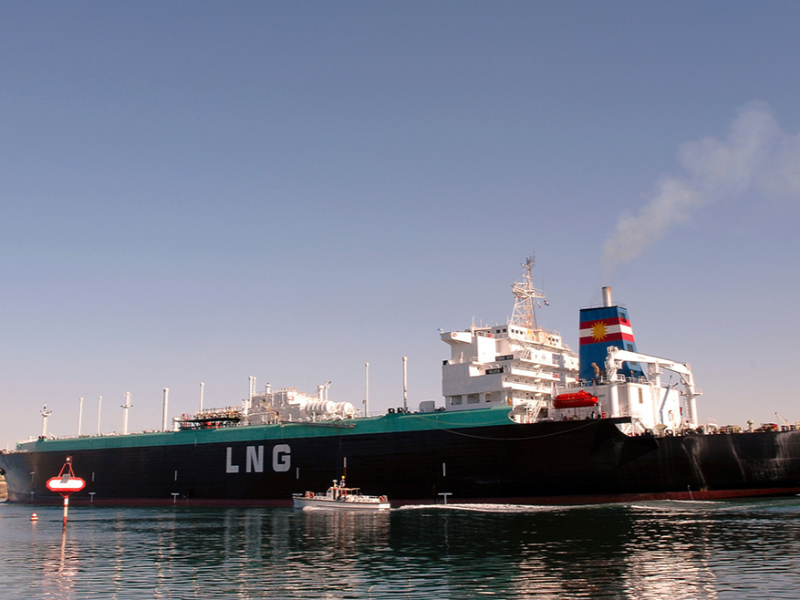- Egyptian Liquefied Natural Gas (ELNG) is a distinguished companies specialising in liquefied natural gas on both the Egyptian and global stages.
- Egyptian LNG is committed to supporting local community development through a comprehensive programme focusing on environmental protection, education, healthcare, and youth empowerment, and collaborates with key stakeholders to ensure sustainable social impact in line with International Finance Corporation’s Performance Standards.
Egyptian Liquefied Natural Gas (ELNG) is highly regarded as a leading company specialising in liquefied natural gas, both within Egypt and internationally. Situated in Idku, 50 kilometres east of Alexandria, the ELNG facility has the potential to expand to a total of six processing trains, each of which may have distinct ownership and gas supply sources. Presently, two trains are operational, each with an annual capacity of 3.6 million tonnes.
Establishing export capabilities
In 1995, the Egyptian General Petroleum Corporation (EGPC) entered into a concession agreement with BG International Limited (BG) and Edison International (Edison) for exploration activities in the West Delta Deep Marine (WDDM) area of the North Eastern Mediterranean. This exploration led to the discovery of a significant natural gas reserve, which far exceeded the domestic demand. Consequently, the agreement was revised in 2001 to permit the export of gas as liquefied natural gas (LNG).
In January 2002, an agreement was reached with Engie (formerly known as GdF) for the supply of 3.6 million tonnes per annum (mtpa) of LNG over a period of 20 years. The project’s sponsors included EGPC, the Egyptian Natural Gas Holding Company (EGAS), BG Asia Pacific Holdings Pte Limited (an affiliate of BG International), Edison, and GdF. They appointed Bechtel to build a single liquefaction train, sized to match the volume of gas to be supplied to Engie (GdF), using the ConocoPhillips Optimised Cascade Process. Construction began in 2002.
Later in the same year, negotiations concluded for the sale of the output from a second train, also with a capacity of 3.6 mtpa, to STASCO (Shell). The construction of Train 2 commenced six months after Train 1. In 2003, Edison divested its share in Egyptian LNG and the upstream WDDM concession to a subsidiary of the Malaysian national oil company, PETRONAS (PETRONAS International Cairo Limited, or PICL Egypt), bringing substantial LNG expertise to the project.
Community engagement and sustainable development
As an active member of the local community, Egyptian LNG is committed to supporting the development of the areas surrounding its operations. The company’s community assistance programme focuses on four key areas: environmental protection, education, healthcare, and youth empowerment. ELNG sets rigorous standards for its community projects and has successfully implemented several initiatives that have had a positive impact on the local communities of El Beheira Governorate and Idku.
ELNG has been recognised for its community engagement efforts, including winning three BG Chairman’s Awards. These accolades were awarded for the company’s work in promoting road safety education in schools within El Beheira and Idku, funding a sustainable water supply project, and fostering sustainable local community employment. Other notable initiatives include building facilities for the deaf and mute in Idku, providing training opportunities for young people, and supporting local industries such as fisheries, agriculture, and handicrafts through partnerships with organisations like ACDI/VOCA.
To further enhance the efficiency and effectiveness of community development, the parties involved in petroleum operations in the Idku hub established a Social Performance Collaboration Forum (SPCF). This forum brings together stakeholders to oversee the development of a social performance programme in line with the International Finance Corporation’s Performance Standards (IFC Performance Standards). The SPCF supports the Idku community by facilitating the financing and implementation of community development programmes. Shareholders in this collaborative effort include Shell Egypt, PETRONAS International Cairo Limited (PICL), Edison International S.p.A., Engie, Rashid Petroleum Company S.A.E., Burullus Gas Company S.A.E., and The Egyptian Operating Company for Natural Gas Liquefaction Projects S.A.E. (ELNG). Through these collective efforts, ELNG and its partners aim to make a lasting positive impact on the social and economic well-being of the Idku community.
About Egyptian Liquefied Natural Gas (ELNG)
Egyptian Liquefied Natural Gas (ELNG) is among the most distinguished companies specialising in liquefied natural gas on both the Egyptian and global stages. Situated in Idku, approximately 50 kilometres east of Alexandria, Egyptian LNG has the capacity for expansion up to six trains in total, potentially with different ownership and sources of feed gas. Presently, two trains are operational, each with a capacity of 3.6 million tonnes per annum. Egyptian LNG represents Egypt’s largest liquefied natural gas joint venture, encompassing both local shareholders, such as the Egyptian General Petroleum Corporation (EGPC) and the Egyptian Natural Gas Holding Company (EGAS), and foreign shareholders, including Royal Dutch Shell, PETRONAS, and Engie—all of which are prominent players in the international industry.

